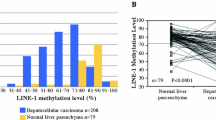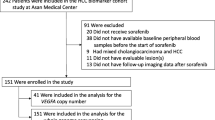Abstract
Background
The impact of folate deficiency on global DNA methylation is uncertain. It also is unclear whether global DNA methylation is associated with outcome in HCC. LINE-1 methylation levels, as a surrogate marker of global methylation, may be influenced by folate deficiency. However, the interaction between LINE-1 methylation and folate level on overall survival (OS) in hepatocellular carcinoma (HCC) patients is unknown. We evaluated whether LINE-1 hypomethylation and folate deficiency are associated with HCC prognosis.
Methods
We prospectively recruited 172 HCC patients between 2008 and 2012. LINE-1 methylation levels in plasma and white blood cells (WBC) were measured by pyrosequencing, and plasma folate levels by a radioprotein-binding assay.
Results
Patients with plasma LINE-1 methylation <70.0% (hypomethylation) had significantly worse OS compared with those with ≥70.0% methylation (hypermethylation) [hazard ratio (HR) = 1.77; 95% confidence interval (CI) 1.12–2.79; P = 0.015]. HCC patients with lower plasma folate levels also had worse survival (<27.7 vs. ≥27.7 nmol/L; HR = 1.96; 95% CI, 1.24–3.09; P = 0.004). Furthermore, survival was poor in patients in whom both plasma LINE-1 methylation and folate levels were low compared with those patients in whom both levels were high (HR = 3.36; 95%CI, 1.77-6.40; P < 0.001). This interaction neared statistical significance (P = 0.057). No significant association was found between WBC LINE-1 methylation levels and survival.
Conclusions
These findings suggest that both lower plasma levels of LINE-1 methylation and folate are associated with worse survival in HCC patients.


Similar content being viewed by others
References
Lee SM, Kim-Ha J, Choi WY, et al. Interplay of genetic and epigenetic alterations in hepatocellular carcinoma. Epigenomics. 2016;8(7):993–1005.
Nishida N, Goel A. Genetic and epigenetic signatures in human hepatocellular carcinoma: a systematic review. Curr Genomics. 2011;12(2):130–7.
Dawson MA, Kouzarides T. Cancer epigenetics: from mechanism to therapy. Cell. 2012;150(1):12–27.
Kazazian HH, Jr. Mobile elements: drivers of genome evolution. Science. 2004;303(5664):1626–32.
Wallace NA, Belancio VP, Deininger PL. L1 mobile element expression causes multiple types of toxicity. Gene. 2008;419(1-2):75-81.
Weisenberger DJ, Campan M, Long TI, et al. Analysis of repetitive element DNA methylation by MethyLight. Nucleic Acids Res. 2005;33(21):6823–36.
Yang AS, Estecio MR, Doshi K, Kondo Y, Tajara EH, Issa JP. A simple method for estimating global DNA methylation using bisulfite PCR of repetitive DNA elements. Nucleic Acids Res. 2004;32(3):e38.
Miousse IR, Koturbash I. The Fine LINE: Methylation Drawing the Cancer Landscape. Biomed Res Int. 2015;2015:131547.
Schwarzenbach H, Hoon DS, Pantel K. Cell-free nucleic acids as biomarkers in cancer patients. Nat Rev Cancer. 2011;11(6):426–37.
Ramzy, II, Omran DA, Hamad O, Shaker O, Abboud A. Evaluation of serum LINE-1 hypomethylation as a prognostic marker for hepatocellular carcinoma. Arab J Gastroenterol. 2011;12(3):139–42.
Tangkijvanich P, Hourpai N, Rattanatanyong P, Wisedopas N, Mahachai V, Mutirangura A. Serum LINE-1 hypomethylation as a potential prognostic marker for hepatocellular carcinoma. Clin Chim Acta. 2007;379(1–2):127–33.
Rossi E, Hung J, Beilby JP, Knuiman MW, Divitini ML, Bartholomew H. Folate levels and cancer morbidity and mortality: prospective cohort study from Busselton, Western Australia. Ann Epidemiol. 2006;16(3):206–12.
Yang Q, Bostick RM, Friedman JM, Flanders WD. Serum folate and cancer mortality among U.S. adults: findings from the Third National Health and Nutritional Examination Survey linked mortality file. Cancer Epidemiol Biomark Prev. 2009;18(5):1439–47.
Siegel AB, Goyal A, Salomao M, et al. Serum adiponectin is associated with worsened overall survival in a prospective cohort of hepatocellular carcinoma patients. Oncology. 2015;88(1):57–68.
Harada K, Baba Y, Ishimoto T, et al. LINE-1 methylation level and patient prognosis in a database of 208 hepatocellular carcinomas. Ann Surg Oncol. 2015;22(4):1280–7.
Anwar SL, Krech T, Hasemeier B, et al. Loss of DNA methylation at imprinted loci is a frequent event in hepatocellular carcinoma and identifies patients with shortened survival. Clin Epigenetics. 2015;7:110.
Zhu C, Utsunomiya T, Ikemoto T, et al. Hypomethylation of long interspersed nuclear element-1 (LINE-1) is associated with poor prognosis via activation of c-MET in hepatocellular carcinoma. Ann Surg Oncol. 2014;21 Suppl 4:S729–35.
Gao XD, Qu JH, Chang XJ, et al. Hypomethylation of long interspersed nuclear element-1 promoter is associated with poor outcomes for curative resected hepatocellular carcinoma. Liver Int. 2014;34(1):136–46.
Zhang C, Xu Y, Zhao J, et al. Elevated expression of the stem cell marker CD133 associated with Line-1 demethylation in hepatocellular carcinoma. Ann Surg Oncol. 2011;18(8):2373–80.
Lee HS, Kim BH, Cho NY, et al. Prognostic implications of and relationship between CpG island hypermethylation and repetitive DNA hypomethylation in hepatocellular carcinoma. Clin Cancer Res. 2009;15(3):812–20.
Zhang YJ, Wu HC, Shen J, et al. Predicting hepatocellular carcinoma by detection of aberrant promoter methylation in serum DNA. Clin Cancer Res. 2007;13(8):2378–84.
Iyer P, Zekri AR, Hung CW, et al. Concordance of DNA methylation pattern in plasma and tumor DNA of Egyptian hepatocellular carcinoma patients. Exp Mol Pathol. 2010;88(1):107–111.
Wong IH, Lo YM, Zhang J, et al. Detection of aberrant p16 methylation in the plasma and serum of liver cancer patients. Cancer Res. 1999;59(1):71–3.
Pogribny IP, James SJ, Beland FA. Molecular alterations in hepatocarcinogenesis induced by dietary methyl deficiency. Mol Nutr Food Res. 2012;56(1):116–25.
Butler LM, Arning E, Wang R, et al. Prediagnostic levels of serum one-carbon metabolites and risk of hepatocellular carcinoma. Cancer Epidemiol Biomark Prev. 2013;22(10):1884-93.
Welzel TM, Katki HA, Sakoda LC, et al. Blood folate levels and risk of liver damage and hepatocellular carcinoma in a prospective high-risk cohort. Cancer Epidemiol Biomark Prev. 2007;16(6):1279-82.
Wu MY, Kuo CS, Lin CY, Lu CL, Syu Huang RF. Lymphocytic mitochondrial DNA deletions, biochemical folate status and hepatocellular carcinoma susceptibility in a case-control study. Br J Nutr. 2009;102(5):715–21.
Chang SC, Goldstein BY, Mu L, et al. Plasma folate, vitamin B12, and homocysteine and cancers of the esophagus, stomach, and liver in a Chinese population. Nutr Cancer. 2015;67(2):212–23.
Cui LH, Quan ZY, Piao JM, et al. Plasma Folate and Vitamin B12 Levels in Patients with Hepatocellular Carcinoma. Int J Mol Sci. 2016;17(7):1032.
Cheng SB, Liu HT, Lin PT, Lai CY, Huang YC. Folate and vitamin B-6 status are not associated with homocysteine, oxidative stress and antioxidant capacities in patients with hepatocellular carcinoma. Eur J Clin Nutr. 2016;70(7):855–8.
Kuo CS, Lin CY, Wu MY, Lu CL, Huang RF. Relationship between folate status and tumour progression in patients with hepatocellular carcinoma. Br J Nutr. 2008;100(3):596–602.
Lin CC, Yin MC. B vitamins deficiency and decreased anti-oxidative state in patients with liver cancer. Eur J Nutr. 2007;46(5):293–9.
Anderson OS, Sant KE, Dolinoy DC. Nutrition and epigenetics: an interplay of dietary methyl donors, one-carbon metabolism and DNA methylation. J Nutr Biochem. 2012;23(8):853–9.
Agodi A, Barchitta M, Quattrocchi A, et al. Low fruit consumption and folate deficiency are associated with LINE-1 hypomethylation in women of a cancer-free population. Genes Nutr. 2015;10(5):480.
Hervouet E, Debien E, Campion L, et al. Folate supplementation limits the aggressiveness of glioma via the remethylation of DNA repeats element and genes governing apoptosis and proliferation. Clin Cancer Res. 2009;15(10):3519–29.
Acknowledgement
This work is supported by NIH Grants R01 ES005116 (RMS), P30 ES009089 (RMS) and by the Ministry of Science and Technology, Taiwan MOST 104-2918-I-038-001 (CCY).
Conflict of interest
There is no interest confliction involved for this submission.
Author information
Authors and Affiliations
Corresponding author
Electronic supplementary material
Below is the link to the electronic supplementary material.
Rights and permissions
About this article
Cite this article
Yeh, CC., Goyal, A., Shen, J. et al. Global Level of Plasma DNA Methylation is Associated with Overall Survival in Patients with Hepatocellular Carcinoma. Ann Surg Oncol 24, 3788–3795 (2017). https://doi.org/10.1245/s10434-017-5913-4
Received:
Published:
Issue Date:
DOI: https://doi.org/10.1245/s10434-017-5913-4




